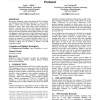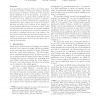1100 search results - page 127 / 220 » Exertion in networked games |
TWC
2008
13 years 10 months ago
2008
Abstract-- Multiuser diversity gains can be achieved by assigning channels to users with better channel quality in multiuser systems. To avoid the extensive information exchange re...
NOSSDAV
2009
Springer
14 years 4 months ago
2009
Springer
Peer-to-peer distributed virtual environments (DVE's) distribute state tracking and state transitions. Many DVE's - such as online games - require ways to fairly determi...
IUI
2003
ACM
14 years 3 months ago
2003
ACM
We present a probabilistic model, based on Dynamic Decision Networks, to assess user affect from possible causes of emotional arousal. The model relies on the OCC cognitive theory...
WICON
2008
13 years 11 months ago
2008
Much previous work has examined the wireless power control problem using tools from game theory, an economic concept which describes the behavior of interdependent but non-coopera...
SODA
2007
ACM
13 years 11 months ago
2007
ACM
A strong equilibrium (Aumann 1959) is a pure Nash equilibrium which is resilient to deviations by coalitions. We define the strong price of anarchy to be the ratio of the worst c...


